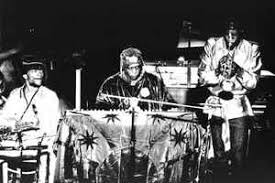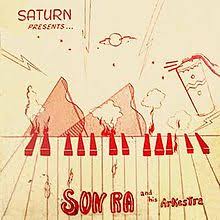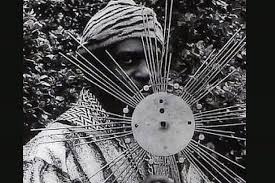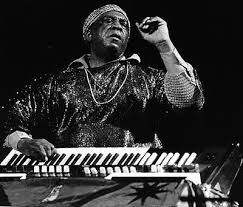|
by Kristen Adams When we use the word ‘classical’, we invoke two ideas: one is the historic, sometimes nostalgic past and one is the musical past of a stylistically strict exploration in a two-keyed music-verse. Using thought processes of Sun Ra, ‘classical’ then equates to the most innate nostalgia there is in humanity, which is the being of Africa. This musician, composer, philosopher, and poet claimed to come from the planet Saturn and to have visited Jupiter. His musical and philosophical thought repositioned the framework of classical music that he appreciated and the other-worldly sounds that he knew to be both within us and our world. On May 14, 1914, Sun Ra was born in Birmingham, Alabama as Herman Poole (“Sonny”) Blount. The desire for world peace accompanied him from Alabama to Chicago, New York, and Philadelphia. He played his music in different venues and created an orchestra that performed throughout his home state. By 1941, however, the US was drafting soldiers for the war, depleting the orchestra until it ceased. He petitioned entering the war with the draft-board and was granted 4-E classification as a “conscientious objector” to military endeavors. Nevertheless, they ordered him to report to an incarceration camp. He later wrote, “To separate me from my music would be more cruel than standing me by a wall and shooting me." He would not accept the spiritual death experienced in prison for not accepting the draft. While held, he wrote poetry and was allowed to practice piano for his fellow inmates when the physician noted his health deteriorating as he labored more and created less. His essence embodied and pioneered Afrofuturism, which reimagines the future of art, science and more through the Black lens, acknowledging what Africa and Black people could have been in the absence of the colonialist system. However, our community continues to uncover that what “could have been” actually was. It was unknown on account of the distribution of powers that favored history from the imperialist lens. Addressing the subtle power behind language, he traces the crucial impact of specific words through phonetic sounds. Consider the word “word”, which he discusses in a 1976 interview on YouTube. He explains, ‘word’ can be expanded when considered phonetically: it can also be spelled, ‘were-d’. This transforms ‘word’ from a written remembrance and existence into the execution of an act, and thus an end of what was. He continues to explain other words, calling upon his knowledge of ancient Egyptian translations and European dialects when Europe was still a land of white tribes while highlighting parts of the Bible that many people ignore. In his philosophy, the unnamed Afrofuturism is forward-looking while recalling the past, the ancient, and the classical. He also cites Chopin and Shostakovich as two of his favorite classical composers. “Sun Ra's piano technique touched on many styles”. These included the “boogie woogie, stride piano and blues” to angular phrases or more percussive sounds that recalled expressions of Count Basie, Ahmad Jamal, Thelonious Monk, and Cecil Taylor (Sun Ra 2014). His goal was to change the world by creating music from “happier worlds”. Therefore, the energy undulating from his music drew upon the interconnectedness of the human, earth, universe, and sounds regardless of diverse and new genres. While philosophically exploring language and the lineage of words, his music traverses all planes of sound. He created a new orchestra called Arkestra, beginning with ‘ar’ to emphasize “Ra”, the ancient Egyptian God of the Sun. Still existing today, the ensemble did not rely on the affirmation of a label or pre-established orchestra to play his compositions. His countless songs and many albums, including Lanquidity, Astro Black, Other Planes of There, Sound of Joy, and Cosmic Tones for Mental Therapy, have led people to categorize his music as Jazz, Free Jazz, Space Music, Bebop, Experimental Music, and Avant-garde Jazz. In reality, his creativity can encompass other genres. Though he passed away on May 30, 1993, his music, philosophy, and impact continue contributing to the sounds of creation today. Musicians and artists of all genres find inspiration in him, as Rolling Stones quotes Shafiq Husyan, “Anybody that’s into music, you would be hard pressed to find someone that’s not into Sun Ra. Especially anybody that’s into progressive music.” Let your further explorations of Sun Ra spur your curiosity about the subconscious impact of word and sound while we celebrate other prominent Black contributors within the classical music sphere. Almost three decades later, COOS's current concert season anticipates performing music of the Afro-British composer Samuel Coolidge-Taylor with the African American composer Florence Price, as well as invited guest artist Dr. Trevor Weston, and more. In addition, COOS will teach and perform with Boston youth at the South End StringFest and during a Boston Latin Academy Residency. Sun Ra's legacy continues! Sources: Farberman, Brad, 2017. Why Is Sun Ra Suddenly Having His Moment?, October 18. https://www.rollingstone.com/music/music-features/why-is-sun-ra-suddenly-having-his-moment-197156/. Sun Ra, 2014. Radio Swiss Jazz. Musician. http://www.radioswissjazz.ch/en/music-database/musician/171626a4c4c0a128a295077d190c9eed2694e/biography. Sun Ra Talks on “The Possibility of Altered Destiny” 11/10/79, 1979. Recording. November 10. https://www.youtube.com/watch?v=rKsMR5YmvyY. Youngquist, Paul, 2016. A Pure Solar World: Sun Ra and the Birth of Afro-Futurism. University of Texas Press.  Kristen Adams is a classically trained violinist who loves the arts. Soon to be matriculating from Wellesley College with a bachelors in economics, her time there included designing, writing, and editing the annual newsletter of the Africana Studies department, as well as engaging in research and exploration of healing tools to remember the collective consciousness, and various musical and artistic activity. Follow Ms. Adams on Instagram at @krrrr_isten
2 Comments
11/9/2022 03:13:58 pm
Enjoyed this article and would like to hear the COOS orchestra. I am writing a presentation on a new version of Scott Joplin's TREEMONISHA by Damien Sneed, composer and Karen Chilton, librettist to be performed by Opera Theatre of St. Louis May 24 - June 27, 2023. They are planning to incorporate Afro futurism in the production design.
Reply
Leave a Reply. |
Details
Writings, musings, photos, links, and videos about Black Artistry of ALL varieties!
Feel free to drop a comment or suggestion for posts! Archives
May 2024
|
Member Login
Black concert series and educational programs in Boston and beyond





 RSS Feed
RSS Feed










